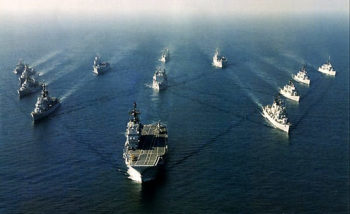
Libya’s Tripoli-based government has invited Italian war ships into its territorial waters to support the fight against human trafficking, Italian Prime Minister Paolo Gentiloni said on Wednesday.
Libyan Prime Minister Fayez al-Seraj, who heads a U.N.-backed government in Tripoli, had refused access to the European Union’s anti-trafficking sea mission Sophia, hobbling its efforts to stop smugglers since patrols began in 2015.
Seraj’s change of heart was announced a day after he agreed a conditional ceasefire and possible elections next year with the divided country’s eastern commander, Khalifa Haftar.
“A few days ago, President Seraj sent me a letter in which he asked the Italian government for technical support by our naval vessels in the common effort to fight human traffickers,” Gentiloni said.
Gentiloni said the request, if parliament agreed to support it, “is necessary” and “would be carried out in Libyan waters by ships sent from Italy”.
People smugglers operating with impunity in Libya have sent hundreds of thousands of migrants to Italy by sea since the start of 2014.
Italy had been leading efforts to bolster Libya’s ability to fight smuggling, signing an agreement with Seraj in February promising millions of euros in funding, but its efforts to bring Libya’s rival governments to the negotiating table had failed.
On Tuesday, French President Emmanuel Macron personally shepherded Libya’s eastern and western factions to a deal, but he cut Italy out of the process, angering some officials in Rome.
Even a limited number of Italian navy ships equipped with the latest surveillance technology could help the Libyans stop migrant boats before they are sent to sea, where some 2,300 have died so far this year, an Italian government source said.
“This could be a game changer,” the source said after the announcement.
Details of the Italy-Libya naval cooperation have yet to be hammered out, but the Defence Ministry is already working on a plan, Gentiloni said. A ministry spokesman was not immediately available for comment.
Italy and the EU have trained members of Tripoli’s coastguard, who are increasingly stopping migrants and bringing them back to shore before they reach international waters where they are often picked up by humanitarian ships.
Because of horrific tales of the abuse, murder and even enslavement of migrants in Libya, humanitarian groups have criticised Italy and the EU for helping Libya close off their escape route.
The Tripoli government’s detention centres, where migrants are held after they are picked up at sea, have also been called “inhuman” by U.N. agencies. The centres are overcrowded, provide no medical care and little food, humanitarian groups that visit them say.
